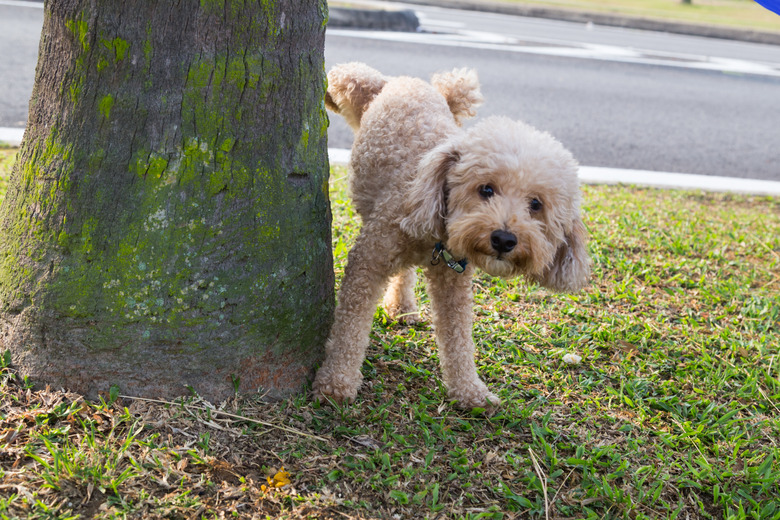Strong Urine In Dogs
When it comes to objectively pleasant odors, dog pee doesn't exactly make the list for most people. Urine definitely has a distinct smell, and while few would consider it to smell "good," healthy urine isn't necessarily "bad" smelling. If you notice that your canine's urine is smelling foul or stronger than usual, it could be indicative of a health issue. Stinky dog pee can suggest infections in the lower urinary tract, bladder, or kidneys, and should be diagnosed and treated by a veterinarian as soon as possible.
Causes of strong urine smell in dogs
Causes of strong urine smell in dogs
One of the most common causes of bad or strong-smelling urine in dogs is a urinary tract infection (canine UTI), which is a fairly common bacterial infection that is easy to treat once it's been diagnosed. Other common symptoms of urinary tract infections in dogs include straining to urinate, crying or whining while peeing, peeing only a very small amount despite a frequent urge to use the bathroom and, in some cases, blood in the urine.
Diabetes in dogs can also cause your dog's pee to have a strong smell, thanks to the bacterial content found in the urine. A diabetic dog can have bacterial growth in the urine due to urinary changes the disease causes, producing a strong odor of urine. If a dog begs to be let out more often than usual or has uncharacteristically frequent accidents in your home in addition to foul dog urine, a medical problem such as a urinary tract infection is the likely culprit.
An untreated urinary tract or bladder infection can lead to problems with the kidneys, which may also result in strong dog pee that smells bad. An infection of this sort is known as pyelonephritis, a bacterial infection that can lead to pain, fever, and vomiting when left untreated. In male dogs, urinary crystals and small bladder stones can block the urethra, which prevents them from being able to urinate. This can lead to a build up of toxins in the blood, which can be life-threatening. If the pee has a strong smell, you should take your dog to the veterinarian immediately as it may be indicative of one of these issues.
Normal dog urine should appear somewhat clear and light yellow. Dehydration can also cause dark-colored or foul dog urine, so be sure to keep plenty of fresh water available for your dog and contact your veterinarian right away if your canine is no longer interested in drinking water.
Urinary tract infection symptoms are also possible warning signs of bladder tumors and bladder diseases. In male dogs, canine UTI symptoms including dog urine that smells strong may also indicate prostate disease in dogs.
Strong urine smell or pyometra in female dog?
Strong urine smell or pyometra in female dog?
Female dogs can experience pyometra, a uterine condition in which a dog's uterus becomes pus-filled. Pyometra is a secondary bacterial infection of the uterus. It occurs as the result of hormonal changes in unspayed female dogs. Pyometra is indicated by a thick, smelly discharge around the dog's vagina. Dogs may also show signs of illness such as vomiting, diarrhea, lethargy, and loss of appetite when they have pyometra. Your dog's veterinarian may recommend an examination or testing to check for pyometra. Additionally, spaying your dog can reduce the chance of pyometra occurring later in your dog's life.
Pyometra has commonalities with other conditions, including the symptom of unpleasant odor. If you think your female dog has stinky dog pee or a canine UTI, make sure to check with the veterinarian to rule out pyometra, which can be life-threatening.
How to reduce urine odor in dogs
How to reduce urine odor in dogs
If your dog has strong smelling urine or canine UTI symptoms, it's vital to take them to their veterinarian immediately. The veterinarian may perform additional tests such as ultrasounds and x-rays to rule out kidney or bladder stones. Additionally, your dog will undergo a urinalysis to determine the cause of the unusually strong urine odor.
Veterinary treatments for strong dog pee smell
Veterinary treatments for strong dog pee smell
The treatment for these conditions varies greatly in cost and procedure; bladder stones may require surgical removal, or the vet may recommend a special diet to treat an underlying condition and eliminate the strong urine smell. Treatments may also include antibiotics, anti-inflammatories, or other specific prescriptions.
Only a qualified veterinarian should test, diagnose, and treat a dog with a suspected canine UTI or strong urine smell.
Providing fresh water is one of the most important things you can do for a dog with foul urine odor. Encourage them to drink it and make water readily available along with frequent bathroom breaks outside. Note any changes in your dog's water intake and report to the veterinarian. Additionally, increased regular water consumption can flush out some of the harmful bacteria in your dog's urinary tract and contribute to the reduction of dog pee odor.
If your dog's urine is staining your fabrics, furniture, carpet, or even your yard, treating indoor areas with an enzyme cleaner can reduce or eliminate odors. For outdoor spaces, soaking the affected area with water, white vinegar, and baking soda may reduce smells.
References
- Veterinary Health Center: Diabetes
- American Kennel Club Canine Health Foundation: Recognizing a Problem and Promoting a Healthy Urinary Tract
- Cornell Margaret and Richard Riney Canine Health Center: Pyelonephritis
- National Library of Medicine: Canine Prostate Disease
- American College of Veterinary Surgeons: Pyometra
- BMC Veterinary Research: Evaluation Of Dogs With Genetic Hyperuricosuria And Urate Urolithiasis Consuming A Purine Restricted Diet: A Pilot Study


